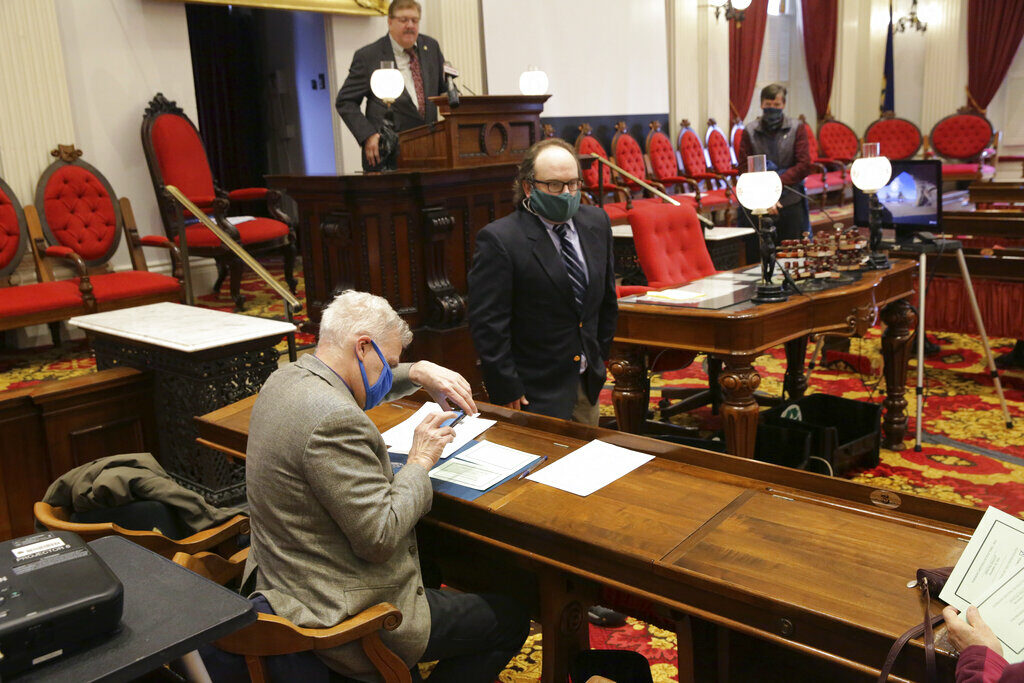Presidential electors coast to coast are casting the votes that will formally choose Joe Biden as the nation’s next president.
In Nevada, the first battleground state won by Biden that voted on Monday, Democratic electors gave Biden and Vice President-elect Kamala Harris the state’s six electoral votes in a session held via Zoom because of the coronavirus pandemic.
Monday is the day set by law for the meeting of the Electoral College. In reality, electors were meeting in all 50 states and the District of Columbia to cast their ballots. The results will be sent to Washington and tallied in a Jan. 6 joint session of Congress over which Vice President Mike Pence will preside.
The electors’ votes have drawn more attention than usual this year because President Donald Trump has refused to concede the election and continues to make unsupported allegations of fraud.
There have been concerns about safety for the electors, virtually unheard of in previous years. In Michigan, lawmakers from both parties reported receiving threats.
Legislative offices there were closed Monday over threats of violence. The 16 electors were to meet in the Senate chamber in a ceremony headed by Democratic Gov. Gretchen Whitmer. Biden won the state by 154,000 votes, or 2.8 percentage points, over Trump.
Amber McCann, spokeswoman for Republican Senate Majority Leader Mike Shirkey, said the closures were made on recommendations from law enforcement “based on credible threats of violence.”
Georgia state police were out in force at the state Capitol in Atlanta before Democratic electors pledged to Biden met. There were no protesters to be seen less than a hour ahead of the meeting.
Even as the Electoral College was formally confirming Biden’s victory, some Republicans continued to refuse to acknowledge that reality. Yet their opposition to Biden had no practical effect on the electoral process, with the Democrat to be sworn in on Jan. 20.
Electors pledged to Trump voted for him in states across the South and Midwest, including Iowa and South Carolina.
In New Hampshire, before the state’s four electors voted for Biden at the State House in Concord, 13-year-old Brayden Harrington led the group in the Pledge of Allegiance. He had delivered a moving speech at the Democratic National Convention in August about the struggle with stuttering he shares with Biden.
Vermont’s electors were the first in the nation to vote Monday and they chose Biden and Harris.
Biden is to address the nation Monday night, after the electors have voted. Trump, meanwhile, is clinging to his false claims that he won the election, and trying to undermine Biden’s presidency before it begins.
“No, I worry about the country having an illegitimate president, that’s what I worry about. A president that lost and lost badly,” Trump said in a Fox News interview that was taped Saturday.
Following weeks of Republican legal challenges that were easily dismissed by judges, Trump and Republican allies tried to persuade the Supreme Court last week to set aside 62 electoral votes for Biden in four states, which might have thrown the outcome into doubt.
The justices rejected the effort on Friday.
Biden won 306 electoral votes to 232 for Trump. It takes 270 votes to be elected.
In 32 states and the District of Columbia, laws require electors to vote for the popular-vote winner. The Supreme Court unanimously upheld this arrangement in July.
Electors almost always vote for the state winner anyway because they generally are devoted to their political parties. There’s no reason to expect any defections this year. Among prominent electors are Democrat Stacey Abrams of Georgia and Republican Gov. Kristi Noem of South Dakota.
The voting is decidedly low tech, by paper ballot. Electors cast one vote each for president and vice president.
The Electoral College was the product of compromise during the drafting of the Constitution between those who favored electing the president by popular vote and those who opposed giving the people the power to directly choose their leader.
Each state gets a number of electors equal to its total number of seats in Congress: two senators plus however many members the state has in the House of Representatives. Washington, D.C., has three votes, under a constitutional amendment that was ratified in 1961. With the exception of Maine and Nebraska, states award all their Electoral College votes to the winner of the popular vote in their state.
The bargain struck by the nation’s founders has produced five elections in which the president did not win the popular vote. Trump was the most recent example in 2016.
Biden topped Trump by more than 7 million votes this year.
And then there’s one more step: inauguration.











